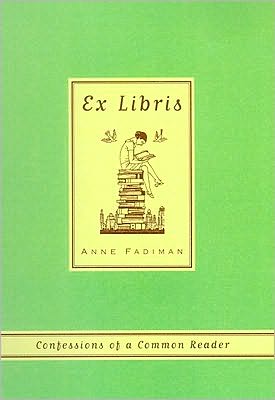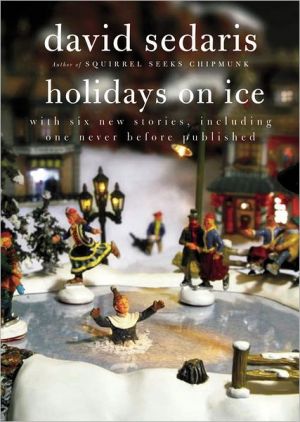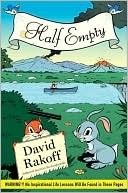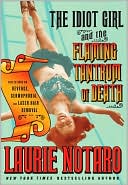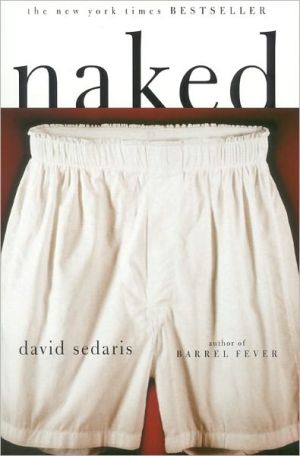Ex Libris: Confessions of a Common Reader
Anne Fadiman is--by her own admission--the sort of person who learned about sex from her father's copy of Fanny Hill, whose husband buys her 19 pounds of dusty books for her birthday, and who once found herself poring over her roommate's 1974 Toyota Corolla manual because it was the only written material in the apartment that she had not read at least twice. \ This witty collection of essays recounts a lifelong love affair with books and language. For Fadiman, as for many passionate readers,...
Search in google:
Anne Fadiman is—by her own admission—the sort of person who learned about sex from her father's copy of Fanny Hill, whose husband buys her 19 pounds of dusty books for her birthday, and who once found herself poring over her roommate's 1974 Toyota Corolla manual because it was the only written material in the apartment that she had not read at least twice. This witty collection of essays recounts a lifelong love affair with books and language. For Fadiman, as for many passionate readers, the books she loves have become chapters in her own life story. Writing with remarkable grace, she revives the tradition of the well-crafted personal essay, moving easily from anecdotes about Coleridge and Orwell to tales of her own pathologically literary family. As someone who played at blocks with her father's 22-volume set of Trollope ("My Ancestral Castles") and who only really considered herself married when she and her husband had merged collections ("Marrying Libraries"), she is exquisitely well equipped to expand upon the art of inscriptions, the perverse pleasures of compulsive proof-reading, the allure of long words, and the satisfactions of reading out loud. There is even a foray into pure literary gluttony—Charles Lamb liked buttered muffin crumbs between the leaves, and Fadiman knows of more than one reader who literally consumes page corners. Perfectly balanced between humor and erudition, Ex Libris establishes Fadiman as one of our finest contemporary essayists.Megan HarlanThese 18 stylish, dryly humorous essays culled from Fadiman's Civilization columns pay tribute to the joys of reading, the delights of language, and the quirks (yes, there are a few) of fellow bibliophiles. -- Entertainment Weekly
\ \ \ \ Chapter One\ MARRYING LIBRARIES\ \ \ A few months ago, my husband and I decided to mix our books together. We had known each other for ten years, lived together for six, been married for five. Our mismatched coffee mugs cohabited amicably; we wore each other's T-shirts and, in a pinch, socks; and our record collections had long ago miscegenated without incident, my Josquin Desprez motets cozying up to George's Worst of Jefferson Airplane, to the enrichment, we believed, of both. But our libraries had remained separate, mine mostly at the north end of our loft, his at the south. We agreed that it made no sense for my Billy Budd to languish forty feet from his Moby-Dick, yet neither of us had lifted a finger to bring them together.\ We had been married in this loft, in full view of our mutually quarantined Melvilles. Promising to love each other for richer or for poorer, in sickness and in health—even promising to forsake all others—had been no problem, but it was a good thing the Book of Common Prayer didn't say anything about marrying our libraries and throwing out the duplicates. That would have been a far more solemn vow, one that would probably have caused the wedding to grind to a mortifying halt. We were both writers, and we both invested in our books the kind of emotion most people reserve for their old love letters. Sharing a bed and a future was child's play compared to sharing my copy of The Complete Poems of W. B. Yeats, from which I had once read "Under Ben Bulben" aloud while standing at Yeats's grave in the Drumcliff churchyard, orGeorge's copy of T. S. Eliot's Selected Poems, given to him in the ninth grade by his best friend, Rob Farnsworth, who inscribed it "Best Wishes from Gerry Cheevers." (Gerry Cheevers, one of Rob's nicknames, was the goalie of the Boston Bruins, and the inscription is probably unique, linking T. S. Eliot and ice hockey for the first time in history.)\ Our reluctance to conjugate our Melvilles was also fueled by some essential differences in our characters. George is a lumper. I am a splitter. His books commingled democratically, united under the all-inclusive flag of Literature. Some were vertical, some horizontal, and some actually placed behind others. Mine were balkanized by nationality and subject matter. Like most people with a high tolerance for clutter, George maintains a basic trust in three-dimensional objects. If he wants something, he believes it will present itself, and therefore it usually does. I, on the other hand, believe that books, maps, scissors, and Scotch tape dispensers are all unreliable vagrants, likely to take off for parts unknown, unless strictly confined to quarters. My books, therefore, have always been rigidly regimented.\ After five years of marriage and a child, George and I finally resolved that we were ready for the more profound intimacy of library consolidation. It was unclear, however, how we were to find a meeting point between his English-garden approach and my French-garden one. At least in the short run, I prevailed, on the theory that he could find his books if they were arranged like mine but I could never find mine if they were arranged like his. We agreed to sort by topic—History, Psychology, Nature, Travel, and so on. Literature would be subdivided by nationality. (If George found this plan excessively finicky, at least he granted that it was a damn sight better than the system some friends of ours had told us about. Some friends of theirs had rented their house for several months to an interior decorator. When they returned, they discovered that their entire library had been reorganized by color and size. Shortly thereafter, the decorator met with a fatal automobile accident. I confess that when this story was told, everyone around the dinner table concurred that justice had been served.)\ So much for the ground rules. We ran into trouble, however, when I announced my plan to arrange English literature chronologically but American literature alphabetically by author. My defense went like this: Our English collection spanned six centuries, and to shelve it chronologically would allow us to watch the broad sweep of literature unfold before our very eyes. The Victorians belonged together; separating them would be like breaking up a family. Besides, Susan Sontag arranged her books chronologically. She had told The New York Times that it would set her teeth on edge to put Pynchon next to Plato. So there. Our American collection, on the other hand, was mostly twentieth-century, much of it so recent that chronological distinctions would require Talmudic hairsplitting. Ergo, alphabetization. George eventually caved in, but more for the sake of marital harmony than because of a true conversion. A particularly bad moment occurred while he was in the process of transferring my Shakespeare collection from one bookcase to another and I called out, "Be sure to keep the plays in chronological order!"\ "You mean we're going to be chronological within each author?" he gasped. "But no one even knows for sure when Shakespeare wrote his plays!"\ "Well," I blustered, "we know he wrote Romeo and Juliet before The Tempest. I'd like to see that reflected on our shelves."\ George says that was one of the few times he has seriously contemplated divorce.\ \ \ Our transfer of books across the Mason-Dixon Line that separated my northern shelves from his southern ones took about a week. Every night we lined up books on the floor, interlarding mine with his before putting them on the shelves, which meant that for a week we had to hopscotch over hundreds of volumes in order to get from bathroom to kitchen to bedroom. We physically handled—fondled, really—every book we owned. Some had inscriptions from old lovers. Some had inscriptions from each other. Some were like time capsules: my Major British Writers contained a list of poets required for my 1970 high-school English final; a postcard with a ten-cent stamp dropped out of George's copy of On the Road.\ As our piles accumulated on the floor, we had several heated debates about not just which books should go together but where they should go. I had lived in the loft for nine years before George moved in, and English literature had always occupied the most public spot, the wall facing the front door. (At the opposite end of the spectrum was a small bookshelf with a door, to the right of my desk, behind which lurked The Zipcode Directory and The Complete Scarsdale Diet.) George thought American literature deserved this place of honor instead. If I agreed to present myself to the world as an acolyte of A. J. Liebling rather than of Walter Pater, I would be admitting that the academic I had once thought I'd be had forever been replaced by the journalist I had become. Deciding that this was the truth and that, furthermore, our entrance wall should represent my husband as well as myself, I capitulated, but with a lump in my throat.\ (Continues...)
PrefaceMarrying Libraries3The Joy of Sesquipedalians11My Odd Shelf21Scorn Not the Sonnet29Never Do That to a Book37True Womanhood45Words on a Flyleaf55You Are There63The His'er Problem71Inse[r]t a Car[e]t79Eternal Ink87The Literary Glutton95Nothing New Under the Sun103The Catalogical Imperative113My Ancestral Castles123Sharing the Mayhem131The P.M.'s Empire of Books139Secondhand Prose147Recommended Reading155Acknowledgments159
\ From Barnes & NobleIf you've ever found yourself organizing your bookshelves by author, subject, and publication date, reordering the polysyllabic ingredients of a shampoo bottle into metrical stanzas, or browsing the owner's manual to the family car in desperate moments of text deprivation, take heart: Ex Libris, Anne Fadiman's wise and charming personal essays on the incurable condition of bibliomania, is compelling proof that you're not alone. Whether chronicling the personal discoveries and agonizing decisions made when she and her husband consolidate their literary treasures in "Marrying Libraries" or the competitive fervor of Sundays spent watching "College Bowl" with her bibliolatrous family in "The Joy of Sequipedalians," exploring the genetic predisposition for compulsive proofreading in "Inset a Carrot," or explaining the rationale of readers who literally love their books to pieces in "Never Do That to a Book," Fadiman conveys her lifelong love affair with books and language with extraordinary humor and grace.\ \ \ \ \ From the Publisher\ "A smart little book that one can happily welcome into the family and allow to start growing old." --Christopher Lehmann-Haupt, The New York Times\ "A book for bookworms . . . 18 stylish, dryly humorous essays"--Entertainment Weekly\ \ \ \ \ Renee TursiIn the literary Eden that forms Anne Fadiman's life, the air remains pure allusion, the marginalia flows, and the only snake in the grass is a typo. \ — The New York Times Book Review\ \ \ \ \ New YorkerEach essay is a model of clarity and lightly worn erudition, and speaks volumes about the author's appreciation for people as well as books.\ \ \ \ \ Economist ReviewThe pleasure of reading have been the special province of essayists from Montaigne onwards. Rarely have the pleasures of books and life been so happily evoked as this.\ \ \ \ \ Megan HarlanThese 18 stylish, dryly humorous essays culled from Fadiman's Civilization columns pay tribute to the joys of reading, the delights of language, and the quirks (yes, there are a few) of fellow bibliophiles. \ -- Entertainment Weekly\ \ \ \ \ Publishers Weekly\ - Publisher's Weekly\ The author of last year's NBCC-winning The Spirit Catches You and You Fall Down, has collected 18 essays about her relationships with books, reading, writing and words. Gathered from the "Common Reader" column Fadiman wrote for Civilization magazine, these essays are all inspired by interesting ideas--how spouses merge their large libraries, the peculiar pleasures of reading mail-order catalogues, the joys of reading aloud, how people inscribe their books and why. Unfortunately, some of these fascinating ideas grow fussy. The minutiae of the shelving arrangements at the Fadiman household brings the reader to agree with the author's husband, who "seriously contemplated divorce" when she begged him to keep Shakespeare's plays in chronological order. The aggressive verbal games waged in Fadiman's (as in Clifton) family are similarly trying: They watched G.E. College Bowl, almost always beating the TV contestants; they compete to see who can find the most typos on restaurant menus; and adore obscure words such as "goetic" (pertaining to witchcraft). At least the author is self-aware: "I know what you may be thinking. What an obnoxious family! What a bunch of captious, carping, pettifogging little busybodies!" Well, yes, but Fadiman's writing, particularly in her briefer essays, is lively and sparkling with earthy little surprises: William Kunstler enjoyed writing (bad) sonnets, John Hersey plagiarized from Fadiman's mother. Books are madeleines for Fadiman, and like those pastries, these essays are best when just nibbled one or two at a time. (Oct.)\ \ \ \ \ Library JournalIn this delightful collection of essays, Fadiman, the award-winning author of The Spirit Catches You and You Fall Down (LJ 9/1/97) and the new editor of The American Scholar, ponders on "how we maintain our connections with our old books, the ones we have lived with for years, the ones whose textures and colors and smells have become as familiar to us as our children's skin." Drawn from Fadiman's "Common Reader" column in Civilization magazine, these 18 pieces wittily explore her family's bibliomania. (Her father, Clifton Fadiman, was a founder of the Book of the Month Club.) From describing the trauma of marrying her personal library with her husband's ("my books and his books had become our books") to detailing the joy of browsing second-hand bookstores ("seven hours later, we emerged...carrying nineteen pounds of books"), Fadiman writes with an appealing warmth and humor. Highly recommended for bibliolaters and bibliophiles everywhere.--Wilda Williams, "Library Journal"\ \ \ \ \ BooknewsIn 18 pieces from her Common Reader column in Civilization magazine, the daughter of the founder of the Book-of-the-Month Club discusses such topics as merging her library with that of her new husband, browsing second-hand book stores, and writing in books. Some bibliographical references. No index. Annotation c. by Book News, Inc., Portland, Or.\ \ \ \ \ The Economist...it is rare the one comes across a writer for whom books and life flow in and out of each other...Anne Fadiman is one...for in Ms Fadiman's world, reading is no longer a silent, inward affair, but something unabashedly communal and dramatic\ \ \ \ \ The New YorkerEach essay is a model of clarity and lightly worn erudition, and speaks volumes about the author's appreciation for people as well as books.\ \ \ \ \ SalonAt age four, Anne Fadiman was building castles out of the 22 volumes of her father's set of Trollope. As a teenager watching the TV quiz show 'College Bowl,' she and her family believed, with good reason, that 'Fadiman U. could beat any other U.' As a young woman hiking the Sierra with her future husband, she lugged, alongside mountains of camping gear, the collected works of John Muir. Call Anne Fadiman a certified bibliomaniac, and she'll own up to it. Clearly, this was no ordinary family and Anne Fadiman no ordinary reader. Her father is Clifton Fadiman, the legendary critic, anthologist and former Book of the Month Club judge. Her mother, Time Magazine correspondent Annalee Jacoby Fadiman, co-authored Thunder Out of China with Theodore White. Their apartment had room for 7,000 books and not much else. Little wonder that their daughter has gone on to take over the helm at the American Scholar and to write the prize-winning The Spirit Catches You and You Fall Down, which chronicled a young Hmong epileptic's encounter with the American medical system.\ Ex Libris, a compilation of essays that Fadiman wrote as a columnist for Civilization magazine, is an unapologetic confession of raging bibliophilia. No need to be scared off by the Latin title. The book is a modest, charming, lighthearted gambol among the stacks. It serves up neither ideas nor theories but anecdotes about the joys of collecting and reading books.\ Like Calvin Trillin, Fadiman believes that family members, however lovable, are best considered as joke material. There's George, the husband excoriated as 'an incorrigible book-splayer' for leaving books overturned and open to page 322 and thus fated to early destruction. Preschool-age daughter Susannah wonders if Rabbit at Rest is a tale about a sleepy bunny. Her 2-year-old brother, Henry, is outed as an unrepentant bibliophage for gnawing on Goodnight Moon.\ The essayist herself admits to an uncontrollable urge to read anything in sight, mail-order catalogs included. How else, she contends, could she possibly educate herself about such essential stuff as the Ultrasonic Wave Cleaner (via Sharper Image) or the three parts of a 16th century soldier's helmet (courtesy of Design Toscano Reproductions for Home and Garden)? Fadiman's wit also touches down on more conventional book-related topics such as flyleaf inscriptions, marginalia, reading aloud, a delight in big words (sesquipedalianism), plagiarism, compulsive proofreading and the art of writing bad sonnets. When the author reveals that she and her husband have finally merged their previously his-and-hers book collections -- no more duplicates, alas, of The Catcher in the Rye or War and Peace -- we know in our bones that they really are married. They're no longer just book lovers, but spouses (Oct. 7, 1998).\ \ \ \ \ \ Christopher Lehmann-Haupt. . .[T]he 18 esays. . .deal usefully with little problems people who care for books would be unlikely to think about systematically, let alone discuss with other readers and writers. . . .[this is] a smart little book that one can happily welcome into the family and allow to start growing old. \ -- The New York Times\ \ \ \ \ Renee TursiIn the literary Eden that forms Anne Fadiman's life, the air remains pure allusion, the marginalia flows, and the only snake in the grass is a typo. \ -- The New York Times Book Review\ \ \ \ \ Kirkus ReviewsAward-winning journalist and editor Fadiman (The Spirit Catches You and You Fall Down) comes from a bookish family (her father is Clifton Fadiman). And part of the charm of these collected personal essays about books and book-loving is the way she adhesively, casually, playfully chronicles her family through its books and bibliomania. An essay about the devoted reader's compulsive love of proofreading opens novelistically with the Fadiman parents and their adult children sitting down to a restaurant dinner and, as their preferred first course, passionately? helplessly? correcting the menu's typos. As a reporter who is here making a transition to the first-person essayist's voice, Fadiman (also the new editor of the American Scholar) maintains a sparkling sense of story, whether the stories tell us about her or about someone else. And her book shows an impish range in subject. In 'Never Do That to a Book,' she comments on hard uses made of books: how we're wont to scribble in them, even teethe on them. 'My Odd Shelf' discusses that part of a bibliomaniac's library dedicated to the anomalous fervent hobby (for George Orwell, it was 'ladies' magazines from the 1860s, which he liked to read in his bathtub.') Fadiman's own odd shelf holds volumes about the history of polar explorations, and she retells some of these sagas in admirably vivid and unadorned style. At times, the origin of the essays as commissioned pieces for the author's column in Civilization magazine does restrict their scope: they seem too brief, glib, coy, or intellectually unventuresome. As a self-described romantic whose imagination lauds the Victorians and seems jovially (and delightfully)anachronistic, Fadiman comes across sometimes as an escapist unwilling to examine the terms of her escape or to question them. Instead, she's intelligently entertained by books—and she's entertaining.\ \
